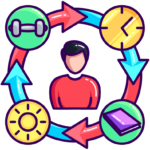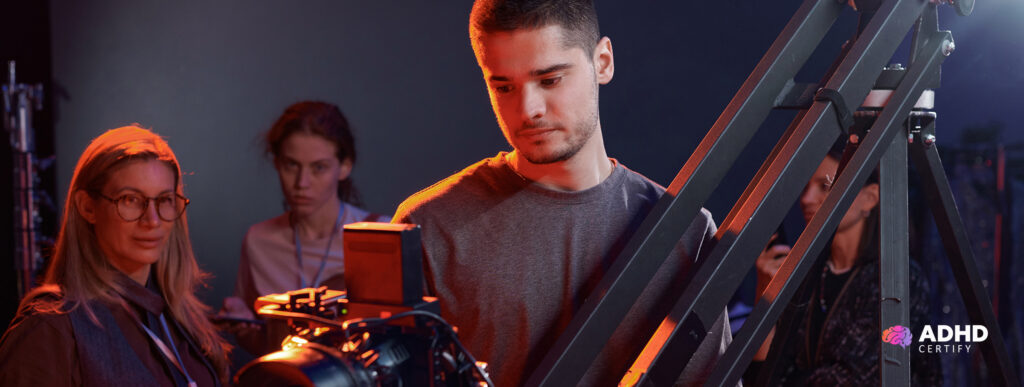For many adults struggling with persistent disorganisation, impulsivity and attention difficulties, an undiagnosed neurodevelopmental condition may be at the root of their challenges. ADHD has long been mischaracterised as merely a childhood condition, but research increasingly confirms it frequently persists into adulthood, often going unrecognised for decades.
The Hidden Struggle: ADHD Beyond Childhood
“I always thought I was just lazy or couldn’t get my act together. Finding out about ADHD in my forties was like someone finally handed me the manual to my own brain,” explains Sarah, a 47-year-old university lecturer diagnosed with ADHD last year.
Unfortunately, Sarah’s own experience mirrors that of many adults living with this condition. A 2022 study from King’s College London found that approximately 2.8% of UK adults meet the diagnostic criteria for ADHD, but fewer than 20% have actually received a formal diagnosis. This shocking statistic highlights the significant gap in recognition and treatment.
ADHD can manifest differently in adults than in children, often becoming more internalised and subtle. Manifestation of symptoms can differ because of both generational and social influences. While hyperactive children may physically struggle to sit still, adults might experience this as a battle of inner restlessness, excessive talking, or difficulty relaxing in the moment. The condition also evolves with age – hyperactivity can often disappear, while attention difficulties and executive function impairments continue, or even intensify as life demands become more complex.
Core ADHD Symptoms
Adult ADHD symptoms typically manifest across three core areas:

Attention Difficulties
- Struggling to maintain focus during lengthy meetings or whilst reading
- Missing important details in conversations or written instructions
- Difficulty completing tasks that require sustained mental effort
- Frequent mind-wandering during conversations
- Problems with time management and consistently underestimating how long things will take

Hyperactivity
- Inner restlessness or feeling constantly “on edge”
- Difficulty sitting still for long periods
- Being a “chatterbox” or unintentionally interrupting others
- Finding it difficult to engage in quiet leisure activities
- Fidgeting or feeling uncomfortable when required to remain still

Impulsivity
- Making hasty and impulsive decisions without considering consequences
- Struggle to hold off on getting what you want right away.
- Blurt out thoughts and interrupt conversations.
- Risk-taking behaviours, from minor to potentially harmful
- Starting projects or making purchases without proper planning
For adults with ADHD, these symptoms not only cause a big impact on their lives but are frequently mislabelled as character traits, fuelling secondary problems like poor mental health and social withdrawal. Research from the University of Oxford published in 2023 found that UK adults with undiagnosed ADHD reported greater difficulties in workplace performance, relationship stability and financial management compared to neurotypical peers.
Beyond the Core Symptoms: Executive Function Challenges
While inattention, hyperactivity and impulsivity represent the diagnostic criteria for ADHD, many adults with the condition struggle most profoundly with broader executive function difficulties.
Professor Jessica Williams of the Institute of Psychiatry, Psychology & Neuroscience at King’s College London explains:
Executive functions are essentially your brain's management system – they help you organise, plan, regulate emotions and adapt to changing circumstances. For adults with ADHD, these systems often develop differently, creating challenges that extend far beyond simply 'not paying attention'.
Professor Jessica Williams
Common executive function difficulties include:
- Working memory deficits: Trouble remembering things whilst using them.
- Task initiation problems: Struggling to start tasks, even important ones.
- Emotional dysregulation: Experiencing strong emotions and having a hard time calming down.
- Time blindness: Poor sense of how much time passes by.
- Organisation challenges: Challenges with getting ready and staying organised.
- Cognitive flexibility issues: Difficulty adapting when plans change.
The Path to Diagnosis
Obtaining an ADHD diagnosis as an adult in the UK has become increasingly challenging. NHS waiting lists for adult ADHD assessments reached an average of 3.5 years in some regions as of early 2024, according to data from the ADHD Foundation.
The diagnostic process typically involves:
- Initial screening: Usually through standardised questionnaires administered by a GP
- Specialist referral: If screening suggests possible ADHD, referral to a specialist (psychiatrist, neuropsychologist, or specialised ADHD service)
- Comprehensive assessment: Detailed clinical interviews, sometimes including:
- Standardised assessment tools
- Interviews with partners or family members (with permission)
- Review of school records when available
- Examination of developmental history
- Differential diagnosis: Ruling out other conditions that may present similarly
Dr Mohammed Patel, consultant psychiatrist specialising in adult ADHD at the South London and Maudsley NHS Foundation Trust, notes:
What makes adult diagnosis complex is that many people have developed compensatory strategies over decades. Some high-achieving individuals have structured their environments to accommodate their challenges without realising it. The key diagnostic question isn't just about symptoms, but about the effort required to function.
Dr Mohammed Patel
Treatment Approaches: Beyond Medication
Effective ADHD management typically involves a multi-modal approach:
Medication
NICE guidelines recommend medication as a first-line treatment for adults with moderate to severe ADHD. Commonly prescribed medications include:
- Stimulants: Methylphenidate (Ritalin, Concerta, Equasym) and lisdexamfetamine (Elvanse)
- Non-stimulants: Atomoxetine (Strattera) and guanfacine (Intuniv)
A 2023 meta-analysis published in The Lancet Psychiatry by researchers at the University of Edinburgh found that appropriate medication reduced core ADHD symptoms by approximately 30-40% in adults, with significant improvements in quality of life measures.
Psychological Interventions
Cognitive Behavioural Therapy (CBT) adapted specifically for ADHD has shown promising results. Recent research from the University of Manchester demonstrated that adults receiving ADHD-focused CBT alongside medication showed greater improvements in organisational skills and emotional regulation than those receiving medication alone.
Other beneficial approaches include:
- Psychoeducation: Understanding how ADHD affects daily functioning
- Coaching: Practical strategies for organisation, time management and planning
- Mindfulness training: Improving attention control and reducing emotional reactivity
Environmental Accommodations
Simple environmental changes can significantly improve functioning:
- Using external organisational systems (digital calendars, reminder apps)
- Breaking tasks into smaller steps
- Creating structured routines
- Reducing distractions in work environments
- Using noise-cancelling headphones or white noise
- Implementing body-doubling (working alongside another person) for difficult tasks
The Impact of Diagnosis and Treatment
For many adults, receiving an ADHD diagnosis brings profound relief. “It was like suddenly having a map after being lost for decades,” explains Thomas, a 38-year-old architect diagnosed two years ago. “I stopped blaming myself for struggles that had a neurological basis.”
The benefits of appropriate treatment extend beyond symptom reduction. Research from University College London published in early 2024 found that adults receiving appropriate ADHD treatment reported:
- 41% improvement in workplace productivity
- 36% reduction in relationship conflicts
- 52% decrease in financial management difficulties
- Significant improvements in self-esteem and quality of life
Supporting Loved Ones with ADHD

For partners, family members and friends of adults with ADHD, understanding the neurobiological nature of the condition is crucial.
Helpful approaches include:
- Learning about ADHD to distinguish between symptoms and character traits
- Working together on practical changes at home or work that make things smoother.
- Communicating in a clear, specific way that’s easier to process
- Recognising and appreciating their ADHD strengths (creativity, problem-solving, enthusiasm)
- Understanding that inconsistency is a symptom, not laziness or lack of care
- Support them in following treatment advice, while making sure they feel in charge of their own decisions
The Future of Adult ADHD Support
The landscape of adult ADHD support in the UK is evolving. Promising developments include:
- Digital Helpers: Apps and online platforms providing ADHD-specific organisational tools
- Stronger Workplace Rights: Growing recognition of ADHD as a protected characteristic under the Equality Act 2010
- Community Support Networks: Online and in-person communities sharing practical strategies
- Remote Support on the Rise: Remote assessment and treatment becoming more widely available
Dr Emily Richardson, clinical psychologist specialising in neurodevelopmental conditions, remains hopeful:
We're seeing a cultural shift in how ADHD is understood. The increasing recognition that ADHD is a lifespan condition affecting approximately 1 in 30 adults means more research funding, better training for healthcare providers, and hopefully, reduced stigma.
Dr Emily Richardson
Adult ADHD remains underdiagnosed and often misunderstood, but awareness is growing. With appropriate support, whether through medication, psychological interventions, or environmental changes, adults with ADHD can thrive, often finding success by playing to the strengths of their unique way of thinking.
For those suspecting they may have undiagnosed ADHD, take the first step and take our Free Online Self Assessment. Meanwhile, learning about executive function, implementing supportive strategies, and connecting with ADHD communities can provide immediate benefits while navigating the diagnostic process.
Recognising ADHD as a different way the brain works, bringing both struggles and potential strengths, signals a major shift in thinking. We’re moving beyond simply listing deficits and towards accepting neurodiversity – understanding that different ‘brain types’ have unique and valuable perspectives to offer.

Adam Carter
Author
Adam Carter is a neurodiversity advocate and experienced content writer for ADHD Certify. With a professional background in education and over a decade of personal experience living with ADHD, Adam writes with deep empathy and insight. He is passionate about creating content that resonates with others on similar journeys, offering clarity, encouragement, and hope. In his spare time, Adam enjoys cycling, gardening, and experimenting with new recipes in the kitchen.
All qualifications and professional experience mentioned above are genuine and verified by our editorial team. To respect the author's privacy, a pseudonym and image likeness are used.




